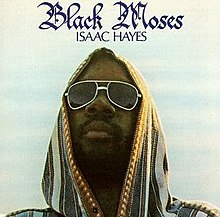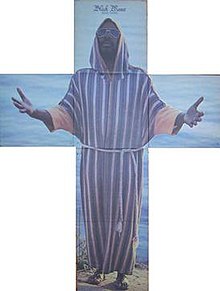Ike's_Rap_II
Black Moses (album)
1971 studio album by Isaac Hayes
Black Moses is the fifth studio album by American soul musician Isaac Hayes. It is a double album released on Stax Records' Enterprise label in 1971. The follow-up to Hayes' successful soundtrack for Shaft (also a double album), Black Moses features Hayes' version of The Jackson 5's hit single "Never Can Say Goodbye". Hayes' version became a hit in its own right, peaking at number 22 on the Billboard Hot 100. The album reached number one on the Billboard R&B album chart on January 15, 1972.
| Black Moses | ||||
|---|---|---|---|---|
 | ||||
| Studio album by | ||||
| Released | November 1, 1971 | |||
| Recorded | March – October 1971 | |||
| Genre | Progressive soul | |||
| Length | 93:38 | |||
| Label | Enterprise | |||
| Producer | Isaac Hayes | |||
| Isaac Hayes chronology | ||||
| ||||
| Singles from Black Moses | ||||
| ||||
| Original LP | ||||
 The LP's cover unfolds a poster-sized image of Hayes as "Black Moses". photo by Joel Brodsky[1] | ||||
In addition to "Never Can Say Goodbye", other selections on Black Moses include covers of songs made popular by The Carpenters ("(They Long to Be) Close to You", Toussaint McCall ("Nothing Takes the Place of You"), The Friends of Distinction ("Going in Circles"), Dionne Warwick ("I'll Never Fall in Love Again"), and Little Johnny Taylor ("Part Time Love"). Hayes named Black Moses as one of his most personal works.[9]
The very same sample of "Ike's Rap II" was used in four tracks at about the same time in the mid-1990s: "Hell Is Round the Corner" by Tricky, "Glory Box" by Portishead, and "Jorge da Capadócia" and "Salve" by Brazilian rap group Racionais MC's.[9] It was also sampled by Alessia Cara in her song "Here" recorded in 2014.
The album's title derives from Stax executive Dino Woodward's nickname for Hayes, which he bestowed upon the musician after comparing the effects of his music on Black audiences to the leadership of the biblical figure Moses.[9] The then-deeply Christian Hayes shied away from the nickname, finding it "sacrilegious",[10] although journalist Chester Higgins popularized the "Black Moses" nickname in an article he wrote on Hayes for Jet. Hayes came to see "Black Moses" as a symbol of Black pride:
Black men could finally stand up and be men because here's Black Moses; he's the epitome of black masculinity. Chains that once represented bondage and slavery now can be a sign of power and strength and sexuality and virility.[9]
Larry Shaw, head of marketing and publicity at Stax, came up with the idea to title Hayes' LP Black Moses.[9] He also devised, with the assistance of Bar-Kays member Ron Gordon, a gatefold album cover design that unfolded into a poster-sized image of Hayes, dressed in biblical-inspired attire as "Black Moses".[9]
| No. | Title | Writer(s) | Length |
|---|---|---|---|
| 1. | "Never Can Say Goodbye" | Clifton Davis | 5:07 |
| 2. | "(They Long to Be) Close to You" | Burt Bacharach, Hal David | 8:58 |
| 3. | "Nothing Takes the Place of You" | Toussaint McCall, Alan Robinson | 5:29 |
| 4. | "Man's Temptation" | Curtis Mayfield | 4:59 |
| Total length: | 24:33 | ||
| No. | Title | Writer(s) | Length |
|---|---|---|---|
| 5. | "Never Gonna Give You Up" | Kenneth Gamble, Leon Huff, Jerry Butler | 5:47 |
| 6. | "Medley: "Ike's Rap II" / "Help Me Love" | Hayes, Johnny Baylor, Mickey Gregory, Luther Ingram, Tommy Tate | 7:31 |
| 7. | "Need to Belong to Someone" | Curtis Mayfield | 5:15 |
| 8. | "Good Love 6-9969" | Gregory, Hayes | 5:15 |
| Total length: | 23:48 | ||
| No. | Title | Writer(s) | Length |
|---|---|---|---|
| 9. | "Medley: "Ike's Rap III" / "Your Love is So Doggone Good" | Hayes, Difosco Ervin, Rudy Love | 9:15 |
| 10. | "For the Good Times" | Kris Kristofferson | 5:20 |
| 11. | "I'll Never Fall in Love Again" | Burt Bacharach, Hal David | 5:02 |
| Total length: | 19:37 | ||
| No. | Title | Writer(s) | Length |
|---|---|---|---|
| 12. | "Part-Time Love" | Clay Hammond | 8:30 |
| 13. | "Medley: "Ike's Rap IV" / "A Brand New Me" | Isaac Hayes, Kenneth Gamble, Thom Bell, Jerry Butler | 9:40 |
| 14. | "Going in Circles" | Jerry Peters, Anita Poree | 7:02 |
| Total length: | 25:12 | ||
Note: Some of the vinyl pressings (and all CD releases) have a non-standard arrangement of the sides: sides 1 and 4 are pressed on one disc along with sides 2 and 3 on the other. This practice, known as "automatic sequence", was intentional on vinyl.[11]
- Isaac Hayes - lead and background vocals
- "Hot", "Buttered", and "Soul": backing vocals
- The Bar-Kays, instrumentation: "(They Long to Be) Close to You" and "Going in Circles"
- Instrumentation on all other tracks by The Isaac Hayes Movement:
- Piano, vibraphone, organ, electric piano - Isaac Hayes
- Bass - Ronnie Hudson
- Bongos, congas - Gary Jones
- Drums, tambourine - Willie Hall
- Electric piano - Lester Snell
- Guitar - Charles "Skip" Pitts
- Piano - Sidney Kirk
- Arranged by Isaac Hayes & Johnny Allen, except "(They Long To Be) Close to You" by Isaac Hayes & Dale Warren
- Engineers: Ron Capone, William Brown, Henry Bush, Eddie Marion, Dave Purple
- Remix engineers: Ron Capone, Dave Purple and Isaac Hayes
- Portishead used a sample from "Ike's Rap II" in the song "Glory Box". That same year (1995), artist Tricky used the same sample on his song "Hell Is Round The Corner".
- Brazilian hip hop group Racionais MC's sampled "Ike's Rap II" on the first track "Jorge da Capadócia" from its 1997 album Sobrevivendo no Inferno.
- Canadian singer Alessia Cara sampled "Ike's Rap II" on her debut single "Here".
- English-Irish singer Maverick Sabre sampled "Ike's Rap II" on his single "Let Me Go".
- The sample was also used in Snoh Aalegra's song "Nothing Burns Like The Cold".
- Isaac Hayes covered the song "Good Love" as his Chef character in the 1999 film South Park: Bigger, Longer and Uncut.
- American rapper Cormega sampled "Medley: "Ike's Rap III"/"Your Love is So Doggone Good" in the song "Love in, Love Out" on his second album, The True Meaning.
- Jason Ankeny. "Joel Brodsky | Biography". AllMusic. Retrieved 2015-08-29.
- Planer, Lindsey (March 3, 2008). Review: Black Moses. Allmusic. Retrieved on 2010-12-28.
- Product notes – Black Moses. Muze. Retrieved on 2010-12-28.
- Columnist (April 2, 2009). Review: Black Moses. Paste. Retrieved on 2010-12-28.
- Deusner, Stephen M. (March 4, 2009). Review: Black Moses. Pitchfork Media. Retrieved on 2010-12-28.
- Gersten, Russell (January 20, 1972). Review: Black Moses. Rolling Stone. Retrieved on 2010-12-28.
- Hultkrans, Andrew (May 2009). "Review: Black Moses". Spin: 95.
- Spencer, Neil (March 2009). Review: Black Moses. Uncut. Retrieved on 2010-12-28.
- Bowman (1997), p.237–240
- Morgan Neville, Robert Gordon, and Mark Crosby [directors, writers, producers] (2007). Great Performances - Respect Yourself: The Stax Records Story (TV documentary). New York City: Tremolo Productions, Concord Music Group, Thirteen/WNET New York.
- "Isaac Hayes - Black Moses". Discogs.com. 1971. Retrieved 18 December 2021.
- Bowman, Rob (1997). Soulsville U.S.A.: The Story of Stax Records. New York: Schirmer Trade. ISBN 0-8256-7284-8